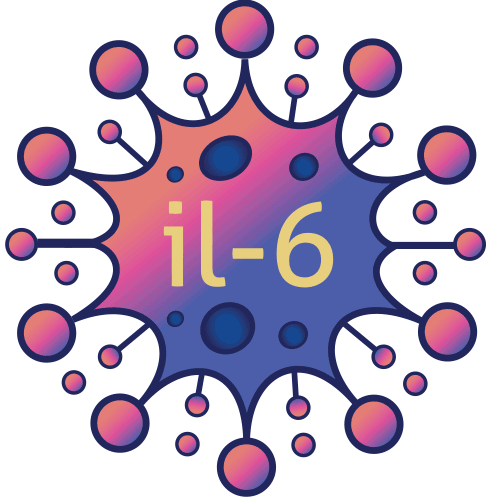Colon Cancer: The Link to IL-6 Levels
- From The Mind of AI

- Nov 18, 2024
- 3 min read
Updated: Dec 30, 2024

Colon cancer, also known as colorectal cancer, is a leading cause of cancer-related deaths worldwide. The progression of colon cancer has been strongly linked to chronic inflammation, with Interleukin-6 (IL-6) playing a significant role in tumor development, progression, and metastasis.
Elevated IL-6 levels contribute to an inflammatory microenvironment that promotes cancer cell survival and growth. Understanding and managing IL-6 levels may provide new strategies for improving outcomes in colon cancer patients.
What is IL-6?
IL-6 is a cytokine involved in immune response and inflammation. While it is essential for protecting the body against infections, persistently elevated IL-6 levels can contribute to chronic inflammation, immune dysregulation, and tumor progression. In colon cancer, IL-6 has been identified as a key driver of tumor growth, angiogenesis (the formation of new blood vessels), and metastasis.
IL-6 and Colon Cancer
Studies show that elevated IL-6 levels in colon cancer patients are associated with:
Tumor Growth: IL-6 enhances the proliferation and survival of cancer cells.
Angiogenesis: IL-6 promotes the formation of blood vessels that supply nutrients to tumors, supporting their growth.
Metastasis: High IL-6 levels contribute to the spread of cancer cells to other organs.
Treatment Resistance: IL-6 is linked to resistance to chemotherapy and other cancer treatments, making the disease more difficult to manage.
Supplements for Reducing IL-6 Levels in Colon Cancer
Supplement | Benefits | Recommended Dosage |
NAD+ | - Reduces IL-6 production and inflammation in the tumor microenvironment.- Enhances mitochondrial function and supports healthy cell repair.- Improves resilience against chemotherapy-induced oxidative stress. | 300 mg to 600 mg daily |
Curcumin | - Inhibits IL-6 and TNF-alpha production.- Reduces oxidative stress and tumor-promoting inflammation. | 500 mg to 1,000 mg daily |
Omega-3 Fatty Acids | - Provides anti-inflammatory effects and reduces cancer cell proliferation.- Supports overall immune health. | 1,000 mg to 2,000 mg daily |
Vitamin D | - Regulates immune function and promotes healthy cell differentiation.- Reduces IL-6-driven tumor progression. | 2,000 IU to 5,000 IU daily |
Additional Key Supplements for Colon Cancer
Supplement | Benefits | Recommended Dosage |
Quercetin | - Inhibits IL-6 signaling pathways and reduces oxidative stress.- Protects healthy cells during cancer treatment. | 500 mg to 1,000 mg daily |
Coenzyme Q10 (CoQ10) | - Enhances cellular energy production and reduces treatment-related fatigue.- Protects against chemotherapy-induced oxidative damage. | 100 mg to 300 mg daily |
Boswellia | - Reduces inflammation in the tumor microenvironment.- Improves gastrointestinal health. | 300 mg to 500 mg daily |
Green Tea Extract | - Contains EGCG, which inhibits IL-6 and reduces cancer cell proliferation.- Enhances antioxidant defense. | 250 mg to 500 mg daily |
NAD+ and Its Benefits for Colon Cancer
NAD+ has shown promise as a supportive therapy in colon cancer management:
Reduces Inflammation: Inhibits IL-6 production and other inflammatory cytokines, reducing the inflammatory environment that promotes tumor growth.
Supports Cellular Repair: Enhances the repair and function of healthy cells damaged by cancer or treatment.
Improves Mitochondrial Function: Boosts energy production and resilience in healthy tissues, helping mitigate treatment-related side effects.
Enhances Immune Function: NAD+ supports immune surveillance to detect and target cancer cells more effectively.
Lifestyle Modifications to Reduce IL-6 Levels
Lifestyle Modification | Description |
Anti-Inflammatory Diet | Emphasize plant-based foods like fruits, vegetables, whole grains, and healthy fats while avoiding red/processed meats and sugar. |
Regular Exercise | Moderate physical activity reduces IL-6 levels and improves overall immune and metabolic health. |
Stress Management | Chronic stress elevates IL-6. Practice mindfulness, yoga, or meditation to reduce stress levels. |
Adequate Sleep | Proper sleep regulates immune function and reduces inflammatory markers like IL-6. |
Gut Health Optimization | Include probiotics and prebiotics to improve gut microbiome health, which can influence inflammation and immune response. |
Hope for Colon Cancer Patients
Targeting IL-6 levels offers a promising approach to managing colon cancer progression and improving treatment outcomes. By incorporating supplements like NAD+, lifestyle changes, and medical therapies, patients can reduce inflammation, slow tumor growth, and enhance their quality of life. As ongoing research into IL-6 modulation continues, new insights and treatments hold the potential to revolutionize care for colon cancer patients.




Comments